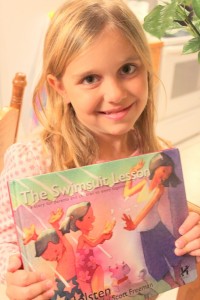No one wants to think about child victimization. As a mother of four kids and a hyper-sensitive person with a vivid imagination, me least of all. But it happens. Consider these sobering statistics:
- According to The Children’s Assessment Center, 500,000 babies will be born in the U.S. this year and abused before they reach the age of 18.
- Females are at a greater risk than males.
- Children are most vulnerable to sexual abuse between the ages of 7-13.
- 73 percent of child victims will not report the abuse for at least a year.
- 70 percent of all reported sexual abuse happens to youth 17 and under.
These facts summon fear in our hearts like a maelstrom. But let us be informed rather than afraid. Let us be proactive rather than frozen. Let us overcome our embarrassment and open the lines of communication with our smallest, most vulnerable family members. I have two suggestions for parents to help guard their children against silent suffering in sexual abuse. First, a tool.
 The Swimsuit Lesson, written by a former police officer, detective, and father of six, is a powerful family resource to help parents gently educate their kids about sexual abuse. After prosecuting dozens of cases of child sexual assault cases, Jon Holsten has made it his goal through speaking and writing to help parents protect their children from sexual predators. He wrote this book to give parents a tangible way to talk to their kids.
The Swimsuit Lesson, written by a former police officer, detective, and father of six, is a powerful family resource to help parents gently educate their kids about sexual abuse. After prosecuting dozens of cases of child sexual assault cases, Jon Holsten has made it his goal through speaking and writing to help parents protect their children from sexual predators. He wrote this book to give parents a tangible way to talk to their kids.
In the story, two kids are swimming on a summer day, and their mother takes the opportunity to talk about the special parts of their body, covered by their suits. She tells them how no one should touch them there except parents or doctors, and if someone should try, they should always tell Mom and Dad. The story is engaging, not explicit, and light-hearted with lovely water-color pictures. I read it with my kids, and they asked some innocent questions. The atmosphere was light-hearted, but I felt that they understood the message. Their private parts are private, and no one has a right to touch them there, even in jest. We used the real terms for private parts so there was no confusion. You don’t have to buy this book to have this conversation with your child; you can have the conversation today. Make sure they know where they should not be touched (except by you or a doctor for bathing or medical checkups), and that if they are touched there, they tell you. That is crucial.
The second suggestion I have is this: Teach your kids about powerful words. In our family, we are talking about powerful words. The first powerful word I have taught the kids is Stop. If they say Stop to each other, whether in tickling or interrupting or hitting or whatever, we are teaching them it is a powerful word, and the person must stop. That goes for us, too. If we as parents are teasing or tickling them, even in silly ways, and one of our kids says Stop, we stop. We respect the power of the word. (Other powerful words include hate, love, and no.) If your child knows they can say Stop and No and that those words have power, it can also benefit them later in those tumultuous teen years when peer pressure abounds.
As uncomfortable as it is to think and talk about these issues, it ranks right up there with swim lessons and crossing the road safely; it’s something we as parents need to do.
